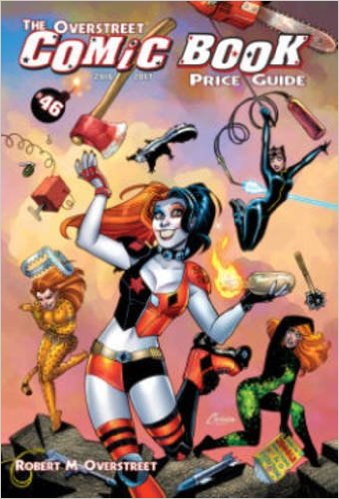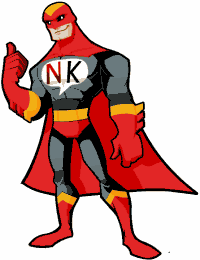|
Investing in Comic Books
by Jim Drucker, CEO NewKadia |
|
Even though we would make more money if more people bought comic books for investment reasons, I need to tell you that making a big profit buying and selling comic books is not easy.
Don't be fooled into speculating in comic books when you hear that someone has sold a comic book collection for $5 million or that the first issue of Action Comics (featuring the debut of Superman) has sold for
$6.1 million. News like that usually sparks a frenzy of comic book buying.
|

|
| | |
 Me with a copy of
Me with a copy of
Action Comics #1
Value 1939: 10¢
Value 1970: $300
Value 1992: $82,000
Value 2012: $2,170,000
Value 2025: $6,100,000
|
It's true that alot of people have made a fortune buying and then re-selling comic books, but before you jump into the game, there are important points to consider.
First, gigantic profits ($100,000 or more per book) generally come from comics books featuring the first appearance of a superhero. The prices of these have been skyrocketing because moviegoers have fallen in love with superhero movies. But beware! It wouldn't have been easy to predict that the "Iron Man" movie would have ignited interest in Iron Man and spawn the Marvel Cinematic Universe, and pump up the value of Iron Man and Marvel comic books, while the "Jonah Hex" movie would be such a fantastic bomb.
The strategy of buying big ticket comic books is only available to those with the cash to invest in these extremely valuable books. Will the value of Action Comics #1 continue to increase? Who knows?
|
A pop culture collectible usually hits its peak value when the item is
40 to 60 years old. I once read that the reason is that when someone hits their best earning years and is looking to invest in a hobby, they seek out products available, but finacially unattainable, when they were a kid. And most people's best earning years are between the ages of 45 and 65.
For example, in car collecting, a hot collectible in the 1960's was the Model T Ford, which was "the car" when 1960s' collectors were teenagers -- 1908 to 1927. But since then, I'd be surprised if the value of a Model T has increased more than the rate of inflation. In contrast, one of today's hot cars is the 1964 Ford Mustang. If you were a teenager in 1964, you're in your 60's today.
|
 1964 Ford Mustang
Value in 1964: $1,999
1964 Ford Mustang
Value in 1964: $1,999
Value in 2025: $101,500
|

Todd MacFarlane and
the home run ball
Value 1999 = $3,050,000
Value 2021 ≈ $250,000
|
Of course, even if you have the money to buy these rarest comics, the value isn't guaranteed to go up. Todd MacFarlane, one of comic's greatest artists and writers (and co-founder of Image Comics) fell into this trap in January 1999 with a different type of collectible. If you're a fan of American baseball, you'll remember the frenzy created in 1998 when Mark McGwire broke the all-time record for most home runs in one season. The record had stood for 37 years. So, MacFarlane, a big baseball fan, spent $3,050,000 to buy the record-breaking 70th home run ball. What in the world could possibly go wrong?
Well, just about everything. First, McGwire was implicated in the steroid scandals and for many people the record became tainted because they believed the record was achieved by cheating -- using illegal drugs. Then, just three years later, Barry Bonds broke McGwire's record by hitting 73 home runs. Bond's record-breaking ball sold for just $450,000 -- 15% of what the McGwire ball sold for just 3 years earlier.
|
But for every MacFarlane financial fiasco, someone hits gold. Nicolas Cage bought his copy of Action Comics #1 for $82,000 in 1992 and 19 years later sold it for $2.1 million. So what does Nicolas Cage know that Todd MacFarlane doesn't know? Well, I don't know and you don't know. And probably even Nicolas Cage doesn't know.
So, if buying a comic book for $100,000 is not for you, the question then becomes, if you buy a comic book today for $3.99, will it ever be worth $100,000? The overwhelming majority will not reach that value in your lifetime, but one might. But you'd have to get lucky and find a comic that the public latches onto and makes a hot commodity.
|
 Nicolas Cage
Nicolas Cage
|
 Walking Dead #1
Value in 2003: $3
Walking Dead #1
Value in 2003: $3
Value in 2014: $10,200
|
For example, when the first issue of "The Walking Dead" was published in 2003, did you identify it as a hot series? If you did, and bought 1000 copies for $3 each, today you'd be very, very rich. One copy sold on eBay for $9,000 in 2014. But who knew that this title, from an unheard of creative team, would turn into a blockbuster TV show which would drive the value of the books through the roof?
And the same for Teenage Mutant Ninja Turtles #1 in 1984. And the same for Fantastic Four #1 in 1961. For that mattter, the same for Action Comics #1 in 1939. Before Superman, super-hero comic books didn't even exist. For every person who could have predicted riches from buying Action #1 or the Walking Dead #1, there's a person who stockpiled Hollywood movies on VHS tapes and said, "I'm gonna make a fortune re-selling these one day."
|
In short, buying new comics on speculation is no more likely to make you rich than buying a lottery ticket or rolling dice at a casino. But at least with a comic you can enjoy reading it.
So even if today's $3 comic might not bring $100,000 in 20 years, might it be worth $200?
Maybe yes, and maybe no. X-Men (1991 series) #1 with the "deluxe" cover sold for $3.99 in 1991 and the 2024 Overstreet Price Guide listed its value at $35. But on July 16, 2025, you could have bought it at NewKadia for $8.65. So, if bought 25 copies for $99.75 in 1991, they'd only be worth $216 in 2025. If contrast, if you bought $100 of Apple stock in 1991 (when each share cost just 39¢) your Apple stock would have been worth $53,600 on July 15, 2025.
|
|
|
|
Then again, for every X-Men #1, there's an Ultimate Spider-Man #1 which cost $3 in 2000. The 2014 Overstreet Comic Book Price guide listed it at $125, but by 2020 they had dropped it to $110. However, in January of 2015. a 1st printing (as opposed to a reprint or promotional giveway copy) in Mint condition sold on eBay for $237. (So much for the accuracy of Overstreet).
So the question is: Could you have guessed that Ultimate Spider-Man's price would have soared and X-Men #1 would have stagnated? If you bought 25 new copies of X-Men #1 for $100, you'd have only $865 in July of 2025. But due to inflation, $100 in 1991 has the equivalent buying power of $231 in 2025. So your real gain is $131, or just $3.85 per year. If you had bought 1,000 new copies of Ultimate Spider-Man #1 for $2,990 in 2000, they'd be worth $110,000 in 2021. So, if you couldn't guess right in 2000, what makes you think you can guess right now?
|
So since you can't guess which books will be hot and which won't, does it make sense to buy one copy of every issue each month? That would guarantee that you'll catch all the unexpected hot comics. If you had bought every comic book published in October 2000 (when Ultimate Spider-Man came out), you would have bought about 500 different comics.
You would have spent $1,500 on the 500 comics (assuming each cost $3) and today you'd have 1 book worth $220 and 499 other books of varying value.
Folks, the odds are not in your favor. The only exception is if you can accurately predict in advance the megahits from the run of the mill. Maybe you can do that; I can't.
Well, where does that leave us?
1. Buy comic books that you will enjoy reading. If you want hundreds of ideas on what you might enjoy, click here.
2. Take good care of your comics. Don't bend them. Don't store them in a garage, basement or attic. (Water or humidity damage is the enemy of paper and will reduce the value of every book).
3. Then, if want to sell them in 20 years or so, after decades of enjoyable reading, you'll probably make back your costs and perhaps make a little profit. And if you buy comics already 15 to 25 years old (as opposed to new books), your odds of making a profit will probably increase (because in 20 years those books will be 35 to 45 years old).
One of the few near-certain ways to make money is to go to yard sales and flea markets. If you can buy any comic whose original price was 20¢ or less and it's in not in ratty condition, you're probably looking at a great profit if you can buy the book for $1 or less. Or, if you can buy any recent comic for 25¢ or less, and are ready to hold onto it for a few years, you'll probably make a profit on it.
|  Overstreet Price Guide Overstreet Price Guide

Buy comics
you'll enjoy reading
|
Once you buy a comic book, you only make a profit when you sell it. But selling a comic isn't as easy as selling a stock. Selling a stock is easy. There's a ready marketplace - the New York Stock Exchange or NASDAQ in the USA and various stock exchanges elsewhere. Since EVERY stock buyer and seller must go through an exchange, sellers are guaranteed to find EVERY buyer interested in their stock.
The comic book marketplace isn't nearly as efficient. There are so many places to sell -- flea markets, yard sales, Craigslist, eBay, comic book stores, comic book websites -- a seller can't find EVERY buyer. That means you'll only reach a few of the people interested in what you're selling. And fewer people fighting for each book means a lower sale price for you. The key is to reach the biggest possible group of potential buyers.
Here are the pros and cons of three common ways people sell a comic collection.
First, to maximize your profits, sell them individually on eBay. But that takes a ton of time. You have to scan each comic, write an auction description, pay eBay's listing fee and then wait to see if the book gets bought. During the auction, you'll have to answer questions about the book. If it doesn't sell, you're right where you started, except you've paid eBay for listing it and gotten nothing in return. If it does sell, then you have to wait for the buyer to pay for it, make sure the check doesn't bounce, box it up, go to the post office and mail it. If it's lost in the mail, you have to deal with that. If the buyer gets it damaged, you have to deal with that. If the buyer wants a refund, you have to deal with that. In short, you're going to give yourself a full-time job.
Second, at the other extreme, sell your books to a comic book store. But this is even worse. You'll be lucky to get even 10% of each book's value. Why? Because the less the store pays you, the bigger its profit. They're not working for you, they're working against you.
I think the third way is best. Sell the books online at NewKadia.com. About 1 million people visit NewKadia.com every year, and another half million view our listings on eBay, so we probably have more potential customers for your books than any other comic book store in the world.
Your local comic book store, with a couple of hundred customers a day is no match for that. We want you to make a fortune, because if you do, we'll do well too. It's easy -- we do all the work; we take care of everything. For a detailed description of the program, click here.
|
Selling on eBay
takes alot of work
| For each comic, you: |
| Write an ad
| | Scan the cover
| | Buy mailing boxes
| | Type shipping labels
| | Go to the post office
| | Deal with lost packages
| | Deal with complaints
| | Answer customer questions
| | Deal with bounced checks
| Pay a listing fee even if
the book does NOT sell
|

|

|
Like any other investment, investing in comics is no sure thing. If anyone tells you otherwise run, don't walk, away. Enjoy reading the stories, enjoy imagining the worlds created, enjoy the excitement of collecting and searching for hard-to-find issues.
If you get all these pleasures from collecting comic books, then it's a great hobby for you.
And if you can make a profit when you sell some or all of your books, treat that as a bonus.
|
| |

 ®
® ®
®
 ®
® ®
®